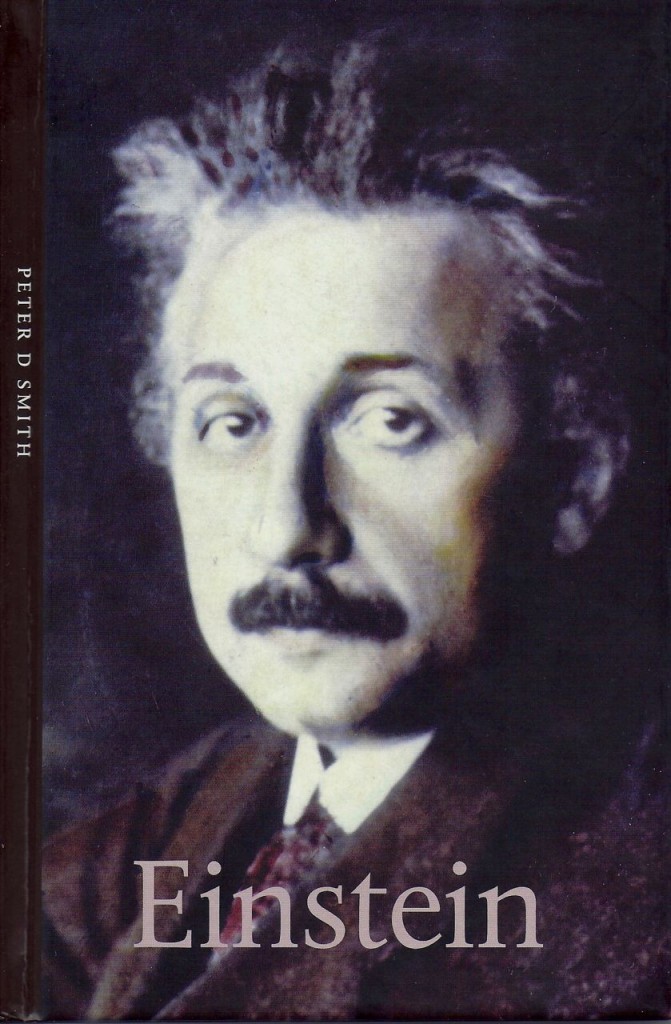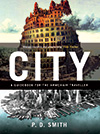Einstein
 The universe was never quite the same again after 1905. Our understanding of space, time, matter and energy was transformed by a 26-year-old civil servant working a 48-hour week at a Swiss patent office. A “respectable Federal ink pisser” was how Albert Einstein described himself. He didn’t even have a PhD. But at the Patent Office, the man who had failed to find an academic job had a secret drawer – it was, he told his friends, the department of theoretical physics. And in 1905, after six months of intensive thought, five scientific papers emerged from this drawer that would revolutionise the laws of physics. My illustrated biography of Einstein was published in 2003. If you’re interested in the impact of science on history and culture, then you certainly can’t ignore Einstein. Over half a century after his death, his face (and unruly hair) are still synonymous with genius. He never courted fame and unlike many scientists he was not interested in positions of power and influence, though many – including the presidency of Israel – were offered. Almost as much as his science, Einstein’s character has endeared him to the public. An outsider in the scientific community, unconventional in his personal life, and unafraid to speak his mind on politics, he has become the twentieth century’s pre-eminent scientific icon. During the 2005 Einstein Year, I was asked to take part in a Horizon programme for BBC TV, Einstein's Unfinished Symphony. We filmed in Einstein’s home – 49 Kramgasse, Bern (now a great little museum) – where he wrote most of his famous 1905 papers. The film makers also arranged access to the former patent office in Bern where Einstein worked for many years. The building is now owned by Swiss Telecom and the room is just another anonymous office. But the view from the second floor window of the Bern roof-scape is largely unchanged. It was fascinating to imagine him gazing out a hundred years earlier, surfing away on a wave of light to escape his mundane work. While staring at those same Swiss rooftops in 1907, he realised that a person falling from one of them (a Bern builder perhaps?) wouldn’t feel his own weight. It was one of those rare eureka moments and it led to the general theory of relativity. The calculations took eight years – in comparison the special theory was “child’s play”. According to physicist Max Born, it was “the greatest feat of human thinking about nature, the most amazing combination of philosophical penetration, physical intuition, and mathematical skill.” Einstein has been translated into Korean, Portuguese and Spanish. (Please contact the publishers, Haus, for foreign rights details.) During 2005, I also took part in some BBC radio programmes on Einstein and wrote a review article for the Guardian on The Genius of Space and Time, covering the major Einstein publications of the centenary year.
The universe was never quite the same again after 1905. Our understanding of space, time, matter and energy was transformed by a 26-year-old civil servant working a 48-hour week at a Swiss patent office. A “respectable Federal ink pisser” was how Albert Einstein described himself. He didn’t even have a PhD. But at the Patent Office, the man who had failed to find an academic job had a secret drawer – it was, he told his friends, the department of theoretical physics. And in 1905, after six months of intensive thought, five scientific papers emerged from this drawer that would revolutionise the laws of physics. My illustrated biography of Einstein was published in 2003. If you’re interested in the impact of science on history and culture, then you certainly can’t ignore Einstein. Over half a century after his death, his face (and unruly hair) are still synonymous with genius. He never courted fame and unlike many scientists he was not interested in positions of power and influence, though many – including the presidency of Israel – were offered. Almost as much as his science, Einstein’s character has endeared him to the public. An outsider in the scientific community, unconventional in his personal life, and unafraid to speak his mind on politics, he has become the twentieth century’s pre-eminent scientific icon. During the 2005 Einstein Year, I was asked to take part in a Horizon programme for BBC TV, Einstein's Unfinished Symphony. We filmed in Einstein’s home – 49 Kramgasse, Bern (now a great little museum) – where he wrote most of his famous 1905 papers. The film makers also arranged access to the former patent office in Bern where Einstein worked for many years. The building is now owned by Swiss Telecom and the room is just another anonymous office. But the view from the second floor window of the Bern roof-scape is largely unchanged. It was fascinating to imagine him gazing out a hundred years earlier, surfing away on a wave of light to escape his mundane work. While staring at those same Swiss rooftops in 1907, he realised that a person falling from one of them (a Bern builder perhaps?) wouldn’t feel his own weight. It was one of those rare eureka moments and it led to the general theory of relativity. The calculations took eight years – in comparison the special theory was “child’s play”. According to physicist Max Born, it was “the greatest feat of human thinking about nature, the most amazing combination of philosophical penetration, physical intuition, and mathematical skill.” Einstein has been translated into Korean, Portuguese and Spanish. (Please contact the publishers, Haus, for foreign rights details.) During 2005, I also took part in some BBC radio programmes on Einstein and wrote a review article for the Guardian on The Genius of Space and Time, covering the major Einstein publications of the centenary year.
Reviews of Einstein
“Peter Smith writes with admirable simplicity about the space-time curve, the photoelectric effect and the equivalence principle. At the same time, he paints a picture of the great boffin as all too human. ..Relatively speaking, this is a marvellous book.” – Christopher Bray, Daily Telegraph, April 30, 2005
“There has never been a better time to take a literary overdose of Einstein. Of these, Smith’s straightforward biography is a perfect place to start. Tight, well-written, strong on historical setting, easily digested and bursting with notes and details of websites, it takes the reader effortlessly through Einstein’s arrogant, self-confident youth (he had no academic post in 1905 because he had been so consistently rude to his Zurich University professors) to his transformation to the iconic, bohemian, rheumy-eyed, gently humorous, self-deprecating genius he is remembered as today.” – Robin McKie, The Observer, March 27, 2005
“Einstein’s complicated character is all here. He was a world celebrity, influential on high events and policies. But there was more to him than science and violin playing; his life as a young man includes episodes that would have been pounced on by today’s tabloids and celebrity gave him influence on policy. Concise, complete, well produced and lively throughout, Smith’s Einstein is a bargain at the price.” – Roy Herbert, New Scientist, July 12, 2003
“This is a pocket-sized volume running to 130 pages and probably no more than 40,000 words of text. Its novelty is that the author has read through the eight volumes of Einstein’s correspondence so far published (out of an estimated total of twenty-five) and gleaned new information about Einstein’s marriage (to a fellow student at Zurich), his divorce and re-marriage and his subsequent affairs. The book will be for many readers a convenient introduction to a fascinating subject. Full length biographies of Einstein appear regularly, and get longer as the years pass. This book should be an excellent means of deciding whether to tackle such a work.” – John Maddox, The New Humanist, June 2003
“This well-written, relatively short book discusses most of the important events of Einstein’s life…An interesting feature of the book is the supplementary material that is interjected throughout in boxed text, including quotes, poems, and supplementary material about Einstein’s science. The book includes a large number of photographs, most in black & white-Smith also supplies a large number of notes, a brief chronology of Einstein’s life, suggested readings, and a list of Web sites. Overall, this good introduction to Einstein’s life is relatively easy to read. Highly recommended. For all Levels.” – BR Parker, CHOICE: Current Reviews for Academic Libraries, December 2003
Articles and reviews by me about Einstein
"The man beneath the electrified halo of hair", Einstein: His Life and Universe, by Walter Isaacson, Guardian, August 25, 2007
"Gravity eclipsed", Einstein's Jury: The race to test relativity, by Jeffrey Crelinsten, Times Literary Supplement, July 21, 2006
"The genius of space and time", article on the best books of the 2005 Einstein Year, Guardian, 17 September 2005
"Time, space and problem hair", article on the exhibition Albert Einstein: Man of the Century, 15 September 2005 – 8 January 2006, The Jewish Museum, London, Times Literary Supplement, 11 November 2005
In Albert's Shadow: The life and letters of Mileva Maric, Einstein's first wife, by Milan Popovic, Times Literary Supplement, January 16, 2004
"Relativity was not just Einstein's monster", review of Einstein's Clocks, Poincaré's Maps by Peter Galison (Sceptre), Independent, 20 September 2003
"With fame I become more stupid", review of The Collected Papers of Albert Einstein, Volume 7, The Berlin Years: Writings, 1918-1921, ed Michel Janssen, et al (Princeton), Guardian , 31 August 2002
"Man behaving (relatively) badly", review of Einstein in Love: a scientific romance, by Dennis Overbye (Bloomsbury), Independent, 01 June 2001

